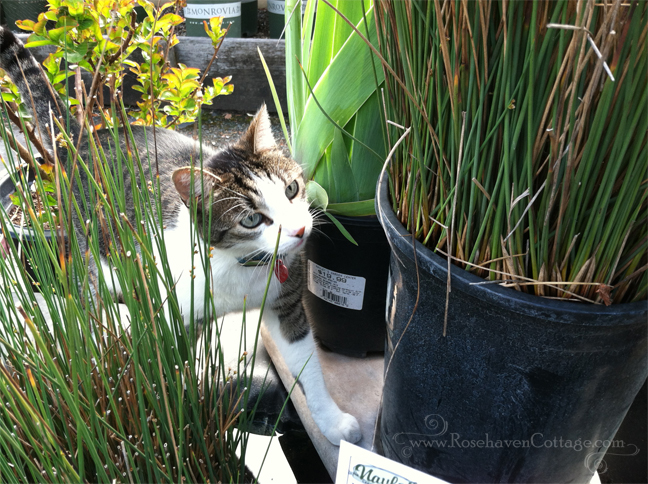A couple of days ago, while hunting for information about something else I stumbled upon an online article that has had me thinking ever since. The particular quote that I continue to contemplate says:
"Think about it, nobody digs and sows, plants and weeds, or sprays bugs in a forest. Still, all those chores are taken care of somehow. The forest grows and feeds its inhabitants, doesn't it?
"If any task in your garden is an unpleasant chore then there is definitely a better way to do it or to eliminate it. Learn from nature. Nature has already developed a solution to every problem that you could possibly encounter in your garden." (from What is permaculture?)The sentence I underlined hit a chord with me and has resonated long after I finished reading.

This resonation has caused me to reflect on one of the first unpleasant chores I eliminated when we moved here over 12 years ago--keeping a lawn. Although mowing the lawn was never a distasteful chore that I did growing up (I learned to enjoy it), the thought of pampering the lawn and coaxing it to be lush and green during our hot, dry summers was not a pleasant prospect.
An interesting chain of events followed that pivotal decision to eliminate any thought of a lawn. And the events came from seemingly unrelated sources:
- Just prior to moving here, I had read (and re-read) Under the Tuscan Sun by Frances Mayes and fallen under the spell of her descriptions of all the herbs and plants she and her husband put into their gardens as they restored the Tuscan villa the gardens surrounded.
- In trying to educate myself on growing herbs and edibles (particularly the ones Frances Mayes wrote about), I discovered the age-old practice of companion planting.
- My mom stumbled upon the website for the National Wildlife Federation where they gave instructions of creating a backyard wildlife habitat.
- I discovered drip irrigation systems at our local hardware store and realized I could hook up all the tubing myself to a timer at the tap so everything got watered at once and regularly. I only had to handwater if I wanted to as a relaxation activity.
- Hubby really wanted me to grow fresh tomatoes for him. I really wanted to grow roses and citrus for me.
- I discovered a collection of gorgeous rocks left by the previous owners under a pile of decomposing leaves and rediscovered how beautiful hardscape can be in the garden. Paths of pea gravel and flagstone looked "Tuscan" to me and, in my estimation, were far prettier than any old lawn.
I took things slowly as far as the design of the garden was concerned. I needed to get to know the seasons in my new climate. I needed to familiarize myself with how the light hit different parts of our lot and how water drained (or didn't). One can only do that by taking things slowly as the seasons roll in and out for at least a year or two. I somehow knew that.
I discovered that one of the most important garden chores I would engage in was sitting parked in a patio chair for long stints of time and simply observing. No earbuds with music from an iPod... no book to read... no one there to chat with... just me sitting alone with the garden. And the garden "told" me an awful lot about itself that I never would have "heard" otherwise.

What ended up happening was that I stumbled upon the very truth that I just read a couple of days ago. I had no idea I had lit upon a key aspect of permaculture. In fact, I'd never read about permaculture until I read the article I quote above.
But somehow my own garden taught me something that nature is always willing to teach anyone who will listen. "If any task in your garden is an unpleasant chore then there is definitely a better way to do it or to eliminate it."
I now enjoy a somewhat symbiotic relationship with my garden. It provides me with so much--particularly serenity. And it doesn't demand much of me in return because I've allowed nature to create a balance. I feel that I was guided through the process of discovering this truth by a much wiser power than my own intellect, so that I could enjoy what the article finally says:
"If you think ahead and design your permaculture garden right, it won't take much effort, it will mostly look after itself, and it will also be incredibly productive and beautiful and attractive to wildlife."I wish I could somehow infuse that vision into others that they could see what lies ahead if they step back and let nature do it's thing. Oh how I wish I could. And that the result doesn't have to look like a tumble-down mess. It can have wonderful structure and still have nature taking care of most of the chores. Your garden can be inspired and designed after ones in Tuscany or cottage gardens in England or the great plains of the North American continent. The possibilities for inspiration are endless.
In the past 12 years, I've learned one more very important truth... there is no such thing as a "green thumb". Those individuals who appear to have a "green thumb" are actually seeking out and absorbing gardening information through every source possible and particularly through observation. That's the only difference between a "green thumb" and a "brown thumb".






























